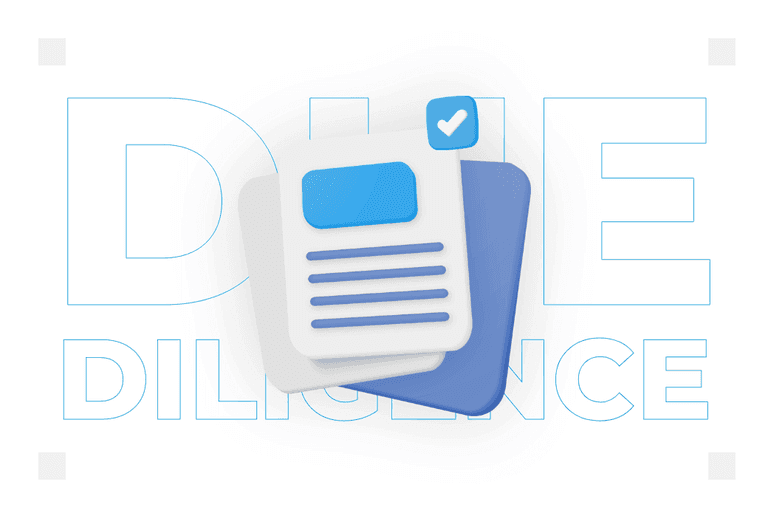
Due diligence – what is it and what does it involve?

Due diligence is a key process in making important business decisions to thoroughly understand and evaluate potential investments. Conducting it correctly can save companies a lot of problems and unforeseen costs in the future.
From this article you will learn:
- What is due diligence?
- What are the principles of due diligence?
- What types of due diligence are there?
- When and to whom do I order due diligence?
- How does due diligence work?
- What influences the costs of due diligence?
- What can I gain from due diligence?
Due diligence – definition
Due diligence is a legal and business term for the thorough and careful examination and analysis that is done prior to making important business decisions, especially before acquiring a company, making an investment or taking other important actions. The process aims to identify the potential risks and rewards of a decision, and to ensure that the decision-maker has full knowledge of the condition and value of the business under investigation.
Due diligence literally translated from English means ‘adequate’ or ‘due diligence’. The concept has its roots in US stock market law, particularly the Securities Act of 1933 (Securities Act of 1933), which introduced requirements for issuers of securities to provide full and fair information to potential investors. In this context, due diligence refers to the process by which investment banks and other institutions carefully examine the information provided by issuers to ensure that it is complete and not misleading.
Due diligence is the detailed examination and evaluation of a company or investment before a business decision is made.
Definition of due diligence.
Over time, the term has taken on a broader meaning and has come to be used in different areas of business to describe the process of thorough and careful examination before a decision is made. Today, it can include financial analysis, legal review, human resources assessment, market and competitor analysis, as well as regulatory compliance and risk assessment studies.
Principles of due diligence
Due diligence is one of the most important stages in the investment process and is intended to ensure that decisions are made on the basis of complete and accurate information. The scope of due diligence may vary from case to case, but some basic principles apply universally:
- The venture or company should be investigated completely and thoroughly so that nothing is missed or overlooked.
- The process should be objective. This means that those carrying out due diligence should not have a conflict of interest.
- Information gained during the process is usually sensitive and confidential. It must be protected and access to it should be limited.
- Due diligence requires a systematic approach and structure. Setting clear milestones, deadlines and responsibilities is key.
- Due diligence practitioners must have full access to all necessary information. In this context, cooperation from the company being investigated is important.
- The involvement of experts from different fields (e.g. finance, law, technology) is often required to thoroughly examine all aspects of the business.
- All information, conclusions and recommendations should be properly documented.
- One of the key elements of due diligence is to understand and assess the potential risks associated with a particular investment or decision.
- It is important to verify and confirm the information gained. One cannot rely solely on the information provided by the seller or investor.
- While the process should be systematic, it must also be flexible enough to adapt to any surprises or newly discovered information.
- Due diligence must be conducted in a timely manner so that the investor or buyer has sufficient time to make an informed decision.
Types of due diligence
Due diligence can take different forms depending on the specifics of the transaction in question and the interests of the party undertaking the process. Each serves to identify potential risks and determine the value and potential of a business or company. Depending on the specifics of the transaction in question, it may be necessary to conduct some or all of the types listed above:
- Financial due diligence focuses on analysing all financial aspects of the company under review. It includes a review of balance sheets, income statements, cash flows, financial projections and other key financial indicators.
- Legal due diligence is an analysis of all legal aspects related to the company. It includes a review of contracts, liabilities, litigation, ownership structure and any other legal issues.
- Operational due diligence focuses on the day-to-day operations and activities of the company. It includes analyses of business processes, organisational structure, human resources or supply chain.
- Technological due diligence assesses the technologies a company owns or uses. It includes analysis of IT systems, intellectual property, technology applications and technology development plans.
- Environmental due diligence focuses on potential environmental issues related to the company’s operations. It includes analyses of compliance with environmental regulations, potential environmental risks or environmental liability.
- Organisational due diligence involves analysis of the organisational culture in a company, management team, remuneration structure, employee contracts and other human resources issues.
- Risk due diligence is the process of identifying, assessing and managing potential risks associated with an investment.
- Commercial due diligence is an analysis of the market, analysis of the competition, the company’s position in the market, growth strategy and other aspects related to the company’s commercial activities.
- Regulatory due diligence assesses the company’s compliance with applicable regulations and laws.
Commissioning due diligence
Commissioning due diligence is a key step in many business transactions, but the exact timing of commissioning due diligence depends on a number of factors – most often it is after initial interest in a particular investment or business and after the initial terms of the transaction have been agreed, but before finalisation. It is important to start due diligence early enough to have enough time to thoroughly investigate all aspects of the company or investment.
When it comes to choosing an entity to conduct the due diligence, it is advisable to turn to professionals who specialise in the field. For financial due diligence, reputable audit or consulting firms will be the ideal choice. For legal aspects, it is worth using law firms with experience in a particular industry or type of transaction. For technological or environmental due diligence, on the other hand, it is advisable to outsource the study to consulting firms specialising in these specific areas. However, do not rely solely on external experts. It is worth involving your own team in the due diligence process, as your staff can provide valuable perspective and help identify key issues.
The course of due diligence
The due diligence process begins with defining the scope of the investigation. This is a key moment when we determine what areas of the company or investment we want to investigate. Often the scope depends on the specifics of the transaction and the needs of the investor or buyer. We then move on to gather preliminary information about the company under investigation, which may include reports, analyses, agreements or financial data provided by the company. At this stage, the aim is to obtain an overall picture.
Once the initial information has been gathered, a deeper analysis can be undertaken. At this point, specialists from various fields – finance, law, technology, etc. – closely examine all aspects of the company’s operations. They may interview management, analyse contracts or test IT systems. It is important to verify and confirm the information gained. It is not possible to rely solely on the data provided by the vendor or investor – it is necessary to see with your own eyes and ears whether the information presented is true.
A deep analysis is followed by a risk assessment. Every investment or acquisition involves a certain amount of risk, and due diligence helps to identify these risks, assess them and consider how they can be minimised. Then comes the time to summarise the findings. The results of the due diligence are compiled into a detailed report that outlines the main findings, potential issues and recommendations. The final step is to present the results to the party’s stakeholders, such as an investor or buyer. Once completed, the parties can proceed to renegotiate the terms of the transaction, aligning them with the results of the due diligence, or decide to abandon the investment.
Due diligence costs
The costs of conducting due diligence depend on a number of factors, which influence the complexity of the process and thus its costliness. First and foremost, they are shaped by the scope of the investigation – if your company wants to conduct a full, comprehensive investigation covering financial, legal, technological and other specialised areas, the costs will be significantly higher than for a more superficial investigation of one particular aspect. Also, the degree of complexity of the issues that may arise during the audit will affect the price, and unforeseen difficulties may increase costs.
Another important factor is the size and complexity of the company being investigated. Due diligence of a large multinational will be more labour intensive and costly than an analysis of a small local company. Expertise also has an impact on costs – the involvement of experts can increase costs as specialists often charge higher rates.
Location also matters. If your company or its assets are scattered in different locations, even in different countries, travel costs and logistics can affect the overall price of the process. At the same time, the duration of the investigation should not be forgotten. If due diligence is to be carried out in a short period of time, it may require more people to be involved, which will also affect costs.
Due diligence costs can vary widely. They can range from a few thousand PLN in the case of small, simple ventures, to hundreds of thousands or even millions in the case of large corporations and complex transactions. Much depends on individual circumstances and the specifics of the task in question. It is worth adding that, despite the costs, due diligence is often necessary to protect the investor’s interests and ensure that it makes an informed and considered investment decision.
Benefits of due diligence
The main purpose of due diligence is to thoroughly understand and evaluate a business or investment before a key business decision is made. One of the most important aspects is to identify the potential risks associated with the investment so that decisions can be made on a fully informed basis and possible pitfalls and risks can be understood.
Conducting due diligence also allows you to accurately assess the value of the business. It is not only a financial issue, but also an analysis of the company’s market position, its growth potential, technology, human resources or organisational culture. In addition, insights into its strategy, competitors, technologies or customer relationships allow you to assess what steps can be taken post-acquisition to ensure further growth and success.
Due diligence is also important from a legal compliance perspective. This includes not only analysing any contracts and obligations, but also checking that the company is operating in compliance with applicable laws and regulations. The process also contributes to building trust between the parties to the transaction, and the open exchange of information, transparency and integrity in the investigation approach helps to maintain a lasting business relationship.
FAQ
Contact form
Develop your brand
Rate content:
You may be interested in:




